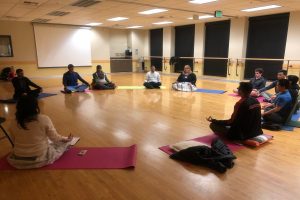Improve Major Depression with Yoga
By John M. de Castro, Ph.D.
“Kriya yoga may be an effective, low-cost, non-drug approach to help patients who do not respond to antidepressants.” – Anup Sharma
Depression affects over 6% of the population. Depression can be difficult to treat. It is usually treated with antidepressant medication. But, of patients treated initially with drugs only about a third attained remission of the depression. After repeated and varied treatments including drugs, therapy, exercise etc. only about two thirds of patients attained remission. But drugs often have troubling side effects and can lose effectiveness over time. Being depressed and not responding to treatment or relapsing is a terribly difficult situation. The patients are suffering and nothing appears to work to relieve their intense depression. Suicide becomes a real possibility. So, it is imperative that other treatments be identified that can relieve the suffering.
Mindfulness training is an alternative treatment for depression. It has been shown to be an effective treatment for depression and its recurrence and even in the cases where drugs fail. Another effective alternative treatment is exercise. But it is difficult to get depressed people, who lack energy, to engage in regular exercise. Yoga is a contemplative practice that is both a mindfulness practice and an exercise. It has been shown to be effective in the treatment of depression. So, it makes sense to further study the effectiveness of yoga for major depression.
In today’s Research News article “Kriya Yoga in Patients with Depressive Disorders: A Pilot Study.” (See summary below or view the full text of the study at: https://www.ncbi.nlm.nih.gov/pmc/articles/PMC8079176/) Srivastava and colleagues recruited adult patients with major depressive disorder who were taking psychotropic medications and offered them Kriya yoga therapy. Those who chose not to participate were assigned to the control condition. Kriya yoga consisted of poses, breathing exercises, chanting, mantra repetition, meditation, and relaxation. For the first 2 weeks they were provided daily 45-minute instruction and practice followed by 6 weeks of 20-minute daily home practice. They were measured before training and at 2, 4, 6, and 8 weeks for depression characteristics and their level of depression.
They found that in comparison to baseline and the control condition, the participants who practiced Kriya yoga had significantly greater decreases in depression at 2, 4, 6, and 8 weeks. All of the participants in the Kriya yoga group achieved remission by 4 weeks while only 24% of the control group did.
The results must be interpreted carefully as the participants were not randomly assigned but rather self-selected to practice yoga or not and there was no follow-up after the completion of training to ascertain if the benefits last beyond the training period. Nevertheless, the participants that selected Kriya yoga in addition to psychotropic medication had faster and greater recovery from their major depressive disorder than participants taking psychotropic medications alone. These are encouraging results and should be followed up with a randomized controlled trial with long-term follow-up.
So, improve major depression with yoga.
“A breathing-based meditation practice known as Sudarshan Kriya yoga helped alleviate severe depression in people who did not fully respond to antidepressant treatments.” – Science Daily
CMCS – Center for Mindfulness and Contemplative Studies
This and other Contemplative Studies posts are also available on Google+ https://plus.google.com/106784388191201299496/posts and on Twitter @MindfulResearch
Study Summary
Srivastava, A., Kuppili, P. P., Gupta, T., Nebhinani, N., & Chandani, A. (2021). Kriya Yoga in Patients with Depressive Disorders: A Pilot Study. Journal of neurosciences in rural practice, 12(2), 362–367. https://doi.org/10.1055/s-0041-1726618
Abstract
Background and Objectives Despite the easy acceptability and holistic nature of Kriya yoga, there are no studies evaluating the role of Kriya yoga intervention on depression. The objective of the current study was to assess the feasibility and effect of adjunctive Kriya yoga on depression.
Methods Patients with major depressive disorder who opted for Kriya yoga were recruited into the intervention group (adjunctive Kriya yoga) and those on psychotropic medication alone were enrolled into the control group. The Hamilton Depression Rating Scale (HDRS) measurements were recorded at baseline, end of 2, 4, and 8 weeks.
Results HDRS scores of the intervention group ( n = 29) were found to be significantly lesser than that of the control group ( n = 52) by the end of 2, 4, and 8 weeks. The remission rate was also significantly greater in the intervention group.
Conclusion Kriya yoga intervention was found to be feasible, as well as improved the severity of depression.
